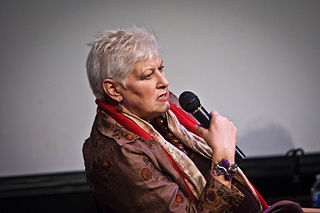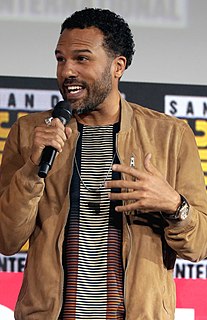A Quote by Matt Haig
I've always thought feminism had a lot to say about both genders, as it is hard to talk about one without the other. I think men and women alike would benefit from men having a more fluid idea of what being a man is.
Related Quotes
On Girls I like being a mouthpiece for the issues I think young females face today. It’s always shocking when people question whether it’s a feminist show. How could a show about women exploring women not be? Feminism isn’t a dirty word. It’s not like we’re a deranged group who think women should take over the planet, raise our young on our own and eliminate men from the picture. Feminism is about women having all the rights that men have.
Whenever I talk about being a feminist or speaking out for equality, it's also about the idea that men are treated with respect. It's not just about treating women like people and not abusing them. You also can't abuse men and you can't say things like, 'Oh, he was just a man. He didn't know any better.' Or 'He's a man, what did you expect?' That's just as abusive and damaging to men, I feel.
A man is not merely a man but a man among men, in a world of men. Being good at being a man has more to do with a man’s ability to succeed with men and within groups of men than it does with a man’s relationship to any woman or any group of women. When someone tells a man to be a man, they are telling him to be more like other men, more like the majority of men, and ideally more like the men who other men hold in high regard.
I get very frustrated when I hear women saying, "Oh, feminism is passé," because I think feminism means empowerment. Men can be feminists, too! Many men are feminists. We need feminism. It's not against men; it's about the empowerment of women. It's the respect of women - giving women equal rights, the same opportunities.
That's what's always been such a curious thing to me about feminism. They never lost any power. However, when you start talking about this particular area of our population, you're talking about the politicized nature of our country where feminism dominates and all heterosexual men want women. And all men realize you've got to do certain things. If you want to get a woman who happens to be a feminist, then you better do and say, be certain things. Men have gone crazy trying to be what they think women want them to be, and that's men in Washington, gone crazy.
I think feminism has always been global. I think there's feminism everywhere throughout the world. I think, though, for Western feminism and for American feminism, it not so surprisingly continues to center Western feminism and American feminism. And I think the biggest hurdle American feminists have in terms of taking a more global approach is that too often when you hear American feminists talk about international feminism or women in other countries, it kind of goes along with this condescending point of view like we have to save the women of such-and-such country; we have to help them.
My feminism has evolved way beyond self-empowerment and I see feminism as a path to peace on earth. The fundamental imbalance that is behind all of the other social diseases is patriarchy. I do believe. As men and women, together, I really long to feel my society evolve its understanding since we're one of the leaders in the f-word. I want us to grow our idea of feminism collectively and get both men and women involved in undoing patriarchy. It's huge. It's a huge job.
Naturally my stories are about women - I'm a woman. I don't know what the term is for men who write mostly about men. I'm not always sure what is meant by "feminist." In the beginning I used to say, well, of course I'm a feminist. But if it means that I follow a kind of feminist theory, or know anything about it, then I'm not. I think I'm a feminist as far as thinking that the experience of women is important. That is really the basis of feminism.
Men give love because they want sex. Women give sex because they want love. That's the difference between men and women. Ever notice how when we talk about our love lives, it's always about a man? Singular. All most of us want is one good man. But when men talk, it's about women. Plural. They want as many as they can get.
My love stories are about people who are reluctant to actualize what they so desperately want. They are timid, cautious, but eventually they dare to speak. My characters are not only hesitant; they are ambivalent about which way their libido flows: toward men or women? They are fluid in their sexuality, and this ambivalence says more about how we think about sex today than, say, Tinder. And this is a truly modern idea: Most of us don't know who we are sexually.
I have a theory about American men -- I think they think women are boys who don't know how to throw a ball very well. American women are forced into the role of being men without penises, of being men who haven't quite been able to make it. If women don't want to be pussycats, then they get forced into the role of being almost as good as men. Which is lousy.





































